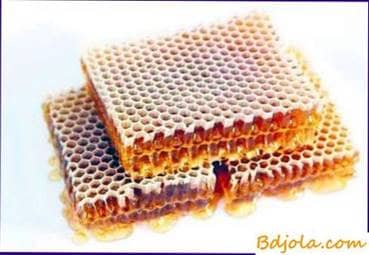
Folk wisdom says that bees are the best friend of the stomach. Honey has a good effect on digestion. The systematic use of honey in food normalizes the work of the gastrointestinal tract.
Based on clinical observations, the author of the book came to the conclusion that bees honey in combination with certain foods reduces the high acidity of the stomach. Thus, bee honey can be used as a therapeutic and dietary remedy for a number of gastrointestinal diseases, accompanied by increased acidity: with gastritis and peptic ulcer (gastric and duodenal ulcers).
It can be assumed that honey during peptic ulcer has a twofold effect: local, which promotes healing of the ulcerous surface of the gastric mucosa, and general, which strengthens the whole organism, especially the nervous system. The latter is very important, since peptic ulcer of the stomach and duodenum arises as a result of a violation of the receptor function of these organs.
With peptic ulcer, we recommend taking 30-60 g of honey in the morning, 40-80 g in the afternoon and 30-60 g in the evening for 1, 1 / 2-2 hours before meals or 3 hours after eating. It is best to take honey for 1, 7-2 hours before breakfast and lunch and 2 hours after a light dinner. This dose is acceptable not only for peptic ulcer, gastritis with high acidity, but also for other diseases. The course of treatment with honey is 2 months, with this treatment the patient should refuse from alcoholic beverages, spicy and spicy dishes.
A good effect is the reception of honey, dissolved in warm boiled water. At the same time liquefaction of mucus in the stomach occurs, rapid absorption of honey without irritation of the intestine. Conversely, the honey aqueous solution in a cold form (room temperature) increases the acidity of the gastric juice, delays the contents of the stomach and irritates the intestines. If the influence of honey on the secretion of the stomach was studied by many researchers, then in relation to the action of honey on the small intestine, it was not possible to find such publications.
The experiments were carried out on rabbits, cats, rats and dogs. The results of the experiments showed that as the concentration and dose of honey increase, the amount of intestinal secretion increases, but at very high concentrations of honey, on the contrary, it decreases. Honey stimulates the release of more alkaline intestinal juice. A good effect on the motor and secretory functions of the digestive tract from all concentrations of honey solutions had a 12.5% solution of honey.
Experiments have shown that the most effective effect of honey solution and infusion of medicinal plants (yarrow, centaury and nettles). X-ray and fluoroscopic observations carried out by the author of the book confirmed the beneficial effect of honey on the motor and secretory functions of the stomach and small intestine.
Пчеловодный инвентарь. Щавелевая кислота для пчел.
Bee Honey